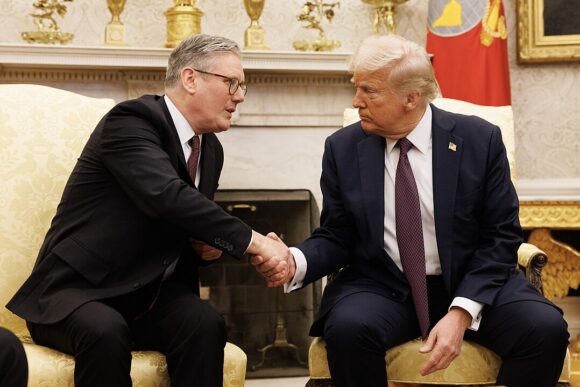President Donald Trump has officially signed a deal that removes select trade barriers between the United Kingdom and the United States, bringing into effect elements of a previously agreed agreement aimed at easing tensions triggered by earlier tariff hikes.
The development, which will ease tariffs on UK vehicle exports to the US, follows weeks of negotiations between the two nations to implement provisions of the arrangement that was announced last month. UK officials have promoted the move as a step toward shielding British industries from the fallout of Trump’s protectionist trade measures.
Despite the breakthrough, the new agreement maintains a 10% tariff on the majority of UK exports—including automobiles—and fails to resolve ongoing concerns surrounding the steep duties on steel and aluminium imports.
Prime Minister Sir Keir Starmer, speaking at the G7 summit in Canada, described the deal as a “very important day” for UK-US relations.
The agreement is the first announced by the White House since Trump initiated sweeping tariffs on imported goods, part of a broader strategy to promote American manufacturing. These measures have had global repercussions, unsettling markets and alarming key trading partners including the UK, which counts the US as a vital destination for auto and steel exports.
Steel Tariff Issues Unresolved
Under the executive order signed Monday, the US will allow up to 100,000 UK-manufactured vehicles to enter the American market with a 10% import duty, a notable reduction from the 25% tariff imposed earlier this year. This change aligns with terms outlined in May. However, details on steel and aluminium imports remain vague.
While the order mentioned plans for a similar tariff structure for metals, no specific figures were provided. When asked about lifting steel tariffs, Trump said the UK was “very well protected,” attributing his position to personal affinity: “You know why? Because I like them.”
UK officials stated they would continue efforts to eliminate the 25% levy on steel, aiming to reach a 0% tariff as previously agreed. However, ambiguity persists regarding the so-called “melted and poured” rule, which requires steel to be both produced and refined in the country of origin to qualify for tariff exemptions.
This stipulation has become increasingly problematic following Tata Steel’s decision to shut down its blast furnaces. As the company transitions to electric arc furnace production, it has had to import steel, complicating its eligibility for US tariff relief.
Transport Secretary Heidi Alexander acknowledged the complexity, noting, “Obviously we’ve still got some more work to do.” She indicated ongoing technical discussions were needed to further reduce the current 25% steel tariff.
Gareth Stace, head of the trade association UK Steel, echoed the sentiment, calling for urgent clarification on both the origin requirements and quota volumes available to UK producers.
Automotive and Ethanol Impacts
The deal also eliminates tariffs on select aerospace products and includes concessions on beef and ethanol. The UK will now allow 1.4 billion litres of US ethanol tariff-free, whereas previously a 19% duty was applied. Additionally, the UK will lift its 20% tariff on US beef and expand the import quota to 13,000 tonnes.
The UK government has emphasized that all imports must still comply with domestic food safety regulations. Business and Trade Secretary Jonathan Reynolds confirmed: “We will update parliament on the implementation of quotas on US beef and ethanol, part of our commitment to the US under this deal.”
However, the ethanol concession has raised alarms in the domestic industry. ABF Sugar, which operates the UK’s largest bioethanol facility, warned of potential job losses if the local market is not adequately safeguarded. Paul Kenward, CEO of ABF Sugar, cautioned that the firm could initiate redundancy consultations by 25 June unless government support is secured. Up to 200 positions at the company’s Vivergo Fuels plant in Hull are at risk.
In the auto sector, the reduced tariffs were met with relief. Mike Hawes, chief of the Society of Motor Manufacturers and Traders, called the agreement “a huge reassurance” for British carmakers. He noted that prior uncertainty had discouraged exports, with firms like Jaguar Land Rover suspending US-bound shipments in April.
JLR has since lowered its earnings projections, citing the impact of the tariffs. Under the previous framework, UK auto exports faced a cumulative 27.5% tariff—2.5% as standard, plus an additional 25%. The new 10% rate offers UK manufacturers a relative advantage over competitors from Italy and Germany, whose exports still incur the higher rate.
Not a Full Trade Deal
While UK ministers have highlighted the agreement as part of broader trade efforts, including deals with the European Union and India, it falls short of a comprehensive free-trade agreement. Trump has characterized it as a “major trade deal,” but legal constraints prevent the US president from entering into formal trade agreements without Congressional approval.
The limited nature of the pact has drawn criticism from opposition politicians. Conservative leader Kemi Badenoch dismissed the agreement as a “tiny tariff deal,” while Liberal Democrat Treasury spokesperson Daisy Cooper urged the government to release full details, including impact assessments on agriculture, food standards, and the steel industry.
Despite the skepticism, the UK government maintains that the deal will strengthen economic ties with the US and protect key industries during a time of global trade uncertainty. The changes are scheduled to take effect seven days after the official publication of the agreement.






